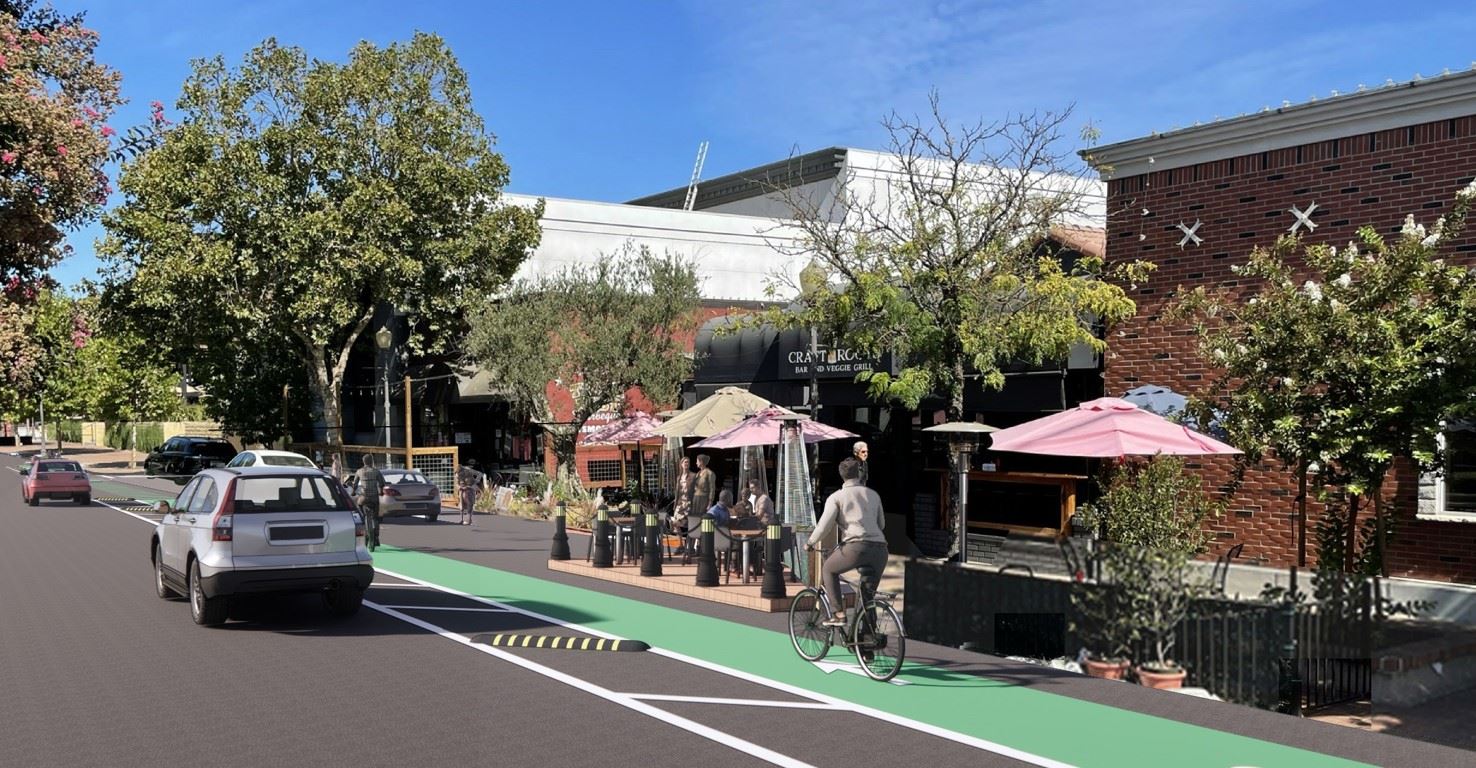City Attorney Donald Larkin provides impartial analysis of two measures’ impacts
![]()

Concept illustraton for downtown Morgan Hill Monterey Road lane reduction. Measure B would restrict such an action to a vote. Photo courtesy of city of Morgan Hill
This editorial is the opinion of Morgan Hill Life
 Morgan Hill voters will find two initiatives on the Nov. 8 ballot. Morgan Hill Life is providing information from the voting material, including analysis from City Attorney Donald Larkin, to help readers make a decision on both measures:
Morgan Hill voters will find two initiatives on the Nov. 8 ballot. Morgan Hill Life is providing information from the voting material, including analysis from City Attorney Donald Larkin, to help readers make a decision on both measures:
MEASURE A
Shall the ordinance, changing zoning regulations throughout the city of Morgan Hill to prohibit buildings with characteristics that could be used for new storage and distribution uses in all areas of the city be adopted?
If adopted, the measure would ratify and re-enact the city council’s ordinance amending the Zoning Ordinance to prohibit certain building types. The measure would ratify the existing prohibition on any new buildings that have 75,000 or more square feet of floor area, ceiling heights of more than 34 feet, and more than one truck loading dock per 25,000 square feet. If approved, repeal or amendment of these regulations would require a further vote of the people.
The measure does not prohibit distribution uses, but instead prohibits buildings with characteristics that may be desirable for intensive storage and distribution users. Stand-alone ecommerce distribution uses are prohibited by other provisions in the Zoning Ordinance.
A “Yes” vote means the current restrictions would remain in effect until amended or repealed by voters.
A “No” vote means the restrictions could be modified or repealed by a vote of the city council.
A majority vote is required for approval.
MEASURE B
 Shall the measure amending the city’s General Plan to require voter approval of any future Monterey Road lane reduction be adopted?
Shall the measure amending the city’s General Plan to require voter approval of any future Monterey Road lane reduction be adopted?
If adopted, the measure would add a new Policy TR1.5 to the General Plan Transportation Element. The new policy would require voter approval to narrow Monterey Road to two lanes through downtown. Without approval, Monterey Road would be required to be maintained as four-lanes.
The state Complete Streets Act requires cities to create programs that “plan for a balanced, multi-modal transportation network that meets the needs of all users of streets, roads, and highways for safe and convenient travel” and defines “users” to include bicyclists, children, persons with disabilities, motorists, pedestrians, users of public transportation and seniors.” To implement the Complete Streets Act, the city has adopted a number of policies and plans to create bicycle and pedestrian improvements, including buffered bicycle lanes, reduced travel lanes in areas with high concentrations of bicycles and pedestrians, and reduced speed limits.
In addition to the General Plan, the city has adopted a Downtown Specific Plan, and Vision Zero strategies to eliminate traffic deaths and serious injuries. By requiring voter approval for a downtown lane reduction, Measure B conflicts with these plans and policies.
As currently designed, Monterey Road meets minimum safety standards when used with due care. Because the road meets current standards, the city is immune from liability from traffic accidents. However, if conditions change due to increased pedestrian activity, changed traffic activity, or new standards, the city could lose its immunity. This could create greater liability for traffic accidents if the road cannot be redesigned in a way that reduces the number of traffic lanes.
A “Yes” vote adopts the new Policy TR1.5.
A “No” vote would retain the existing General Plan and Vision Zero policies that could allow a future reduction in the number of travel lanes on Monterey Road through downtown.
This measure was placed on the ballot by a petition signed by the requisite number of voters. A majority vote is required for approval.






